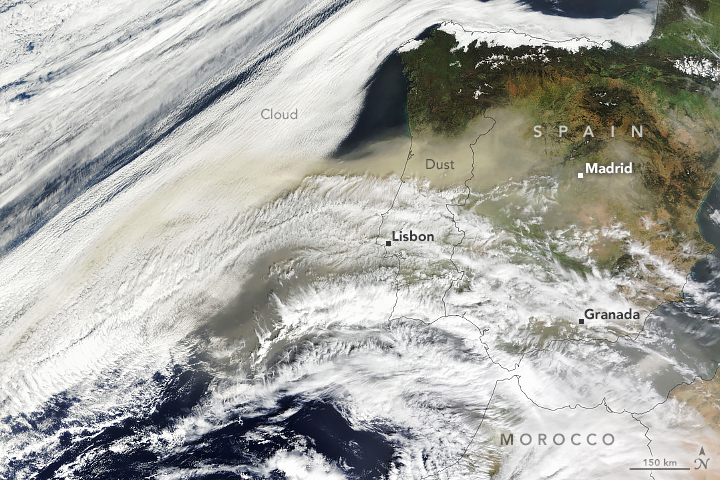Desert Dust Envelops Portugal and Spain
Mar 27, 2024
Hot winds known as the “calima” brought an intrusion of dust from the Sahara Desert to Portugal and Spain in late March 2024. Suspended particles reached the region on March 21, coloring skies orange and degrading air quality for several days.
The MODIS (Moderate Resolution Imaging Spectroradiometer) on NASA’s Terra satellite captured this image of dust enveloping the Iberian Peninsula on March 22. On that day, snowy slopes at a ski resort near Granada were tinged with brown from dust deposition and other areas saw “muddy” rain, according to news reports.
In the winter and spring, dust emerging from North Africa tends to be carried by the northeast trade winds toward the United Kingdom and western Europe, as shown here, at relatively low altitudes. In contrast, from late spring to early fall, the Saharan Air Layer carries dust westward across the Atlantic Ocean higher in the atmosphere.
In a recent analysis, researchers found a spike in the frequency and intensity of wintertime Saharan dust intrusions into Europe in 2020–2022 compared with 2003–2019. The results were based on MODIS aerosol measurements and the MERRA-2 weather reanalysis model maintained by NASA’s Global Modeling and Assimilation Office (GMAO).
While winter 2023 was comparatively calm in terms of dust, the extreme events are back in 2024, the study authors said in media coverage. In addition to the March storm, powerful winds sent desert dust streaming over the Canary Islands and north toward the U.K. in January 2024.
The researchers suggested several factors that may be contributing to these recent intense events. One is an ongoing drought in northwest Africa increasing the amount of dust that can be carried away by the wind. Another is “blocking” weather patterns that divert the jet stream and result in winds more often blowing north from the Sahara.
Dust from these storms can also impact snowpack when it falls in mountainous regions. A study of a 2021 dust event found that dust darkened snow in the Alps, decreasing its reflectance by 40 percent and warming the surface. This reduced the snow depth in the Alps by half in less than a month.
NASA Earth Observatory image by Michala Garrison, using MODIS data from NASA EOSDIS LANCE and GIBS/Worldview. Story by Lindsey Doermann.
